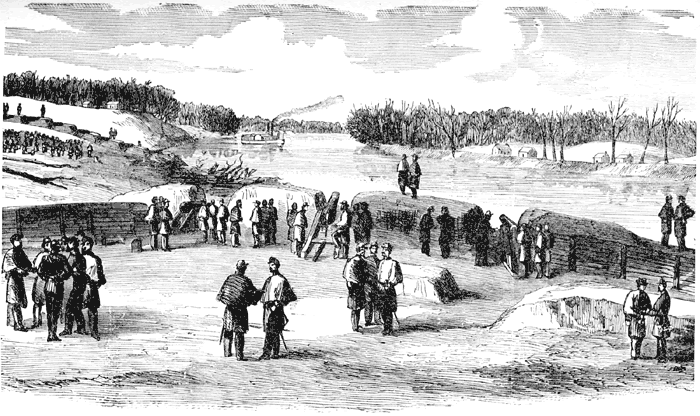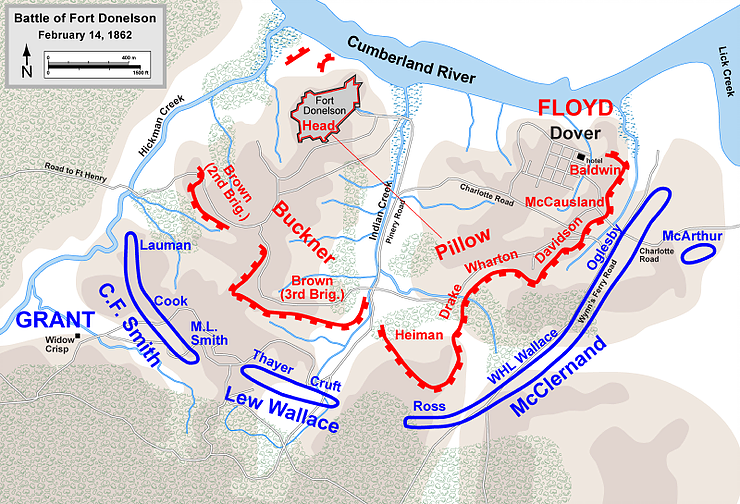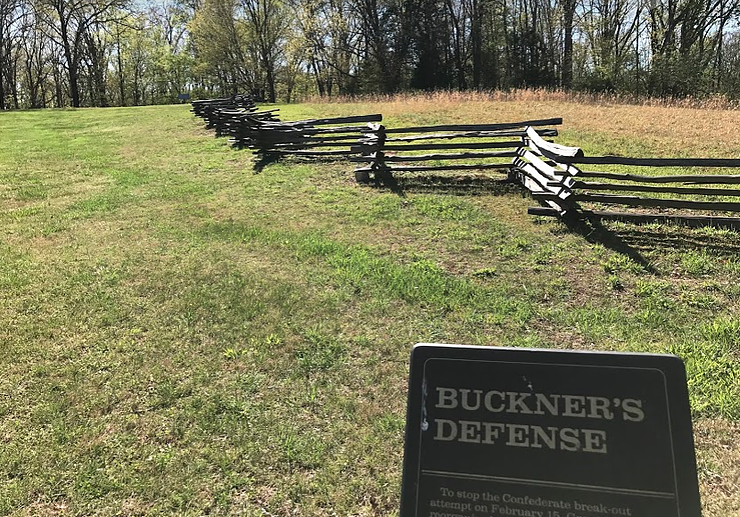About Publications Library Archives
cthl.org

Preserving American Heritage & History

Preserving American Heritage & History


On February —, in pursuance of orders, I proceeded, with my regiment upon the cars, from Russellville, Ky., to Clarksville, Tenn. When I arrived there I was ordered by General Pillow to embark immediately for Fort Donelson. I arrived there that night. General Bushrod R. Johnson accompanied us, and when we arrived he took command. General Pillow arrived on the —, and soon after his arrival he placed the troops in the position afterwards held by them. I was assigned to the extreme right of the line, extending from the right of Colonel Palmer’s regiment to a slough formed by the high state of water in the river. The position was about half a mile in length, and was a protection in front and to the right of the original line of defense marked out for the fort. I was directed to construct rifle pits, which I did, locating them more than a hundred yards apart, at points best commanding the approaches to the position. They were made in a day and night, and were necessarily very imperfect. I was directed to give up my tools, to be used upon other parts of the defenses.

On Wednesday, February 12, the enemy made his appearance in large force, pressing around in our front, with the evident intention of investing our position. Nothing was done to oppose or prevent his progress, and the following morning found his lines extending from the point of their disembarking to a point on the river above our position.
On Thursday morning the enemy made three several attacks upon my position; in all of which they were repulsed, with but slight loss upon our part and very heavy upon theirs. In resisting these attacks I was greatly assisted by Porter’s battery upon the left. It always fired at the right time and to the right place.
On Thursday night I was re-enforced by Captain Jackson’s Virginia artillery, four pieces. Although the night was cold and inclement, and the men much exhausted from the day’s fighting and several days of hard work, we succeeded in getting these pieces in good position and well protected.
On Friday I was re-enforced also by Colonel Palmer’s regiment. We remained under arms and in ranks all day Friday, expecting the attack to be renewed. The firing of the sharpshooters was incessant from Thursday morning until the surrender, disturbing and almost destroying the repose of my command.
On Saturday morning I was conducted by yourself to the position assigned us as a reserved regiment and a supporting force for Graves’ artillery. I was directed not to leave my trenches until I was relieved by a Tennessee regiment from the fort. The failure of this regiment to arrive as soon as contemplated delayed me in reaching the point assigned me. A small detachment of Tennesseeans arrived and I placed them in the trenches, and immediately thereafter moved rapidly to the battle-field.
I remained in rear or near Graves’ battery, under the immediate supervision of General Buckner, until about noon, when Colonel Baldwin, of Mississippi, announced to me that he was out of ammunition, and stated that unless he could get ammunition and re-enforcements there was great danger of losing the ground which had been won. I had near by a wagon of ammunition, and with the perseverance of Quartermaster Estep and Lieutenant Semple the ammunition was soon supplied. Previous to this period some one mounted, purporting to be a staff officer, approached the regiment and ordered off two of the left companies to re-enforce Colonel Baldwin’s command. These two companies, supposing it to be the order of Generals Pillow or Buckner, moved off at a double-quick, and were soon engaged with the enemy and against greatly superior numbers. Colonel McCausland, of Virginia, arrived, and said that unless they were re-enforced the enemy would retake what they had gained; that after four hours of hard fighting the enemy were bringing forward new troops and in overwhelming numbers. I examined the state of the contest. I saw Colonel Forrest make two gallant but unsuccessful charges. I saw that the enemy were gradually driving us back. My men were eager for the fight. I felt confident that I could dislodge the enemy and drive them from their position. I sent for General Buckner. He had gone to the right and was conducting another movement. There was no time for delay. I concluded to take the responsibility and make the effort. I marched the regiment across the abatis, a distance of more than a quarter of a mile. When I reached the little ravine where Forrest was with his cavalry I halted the regiment, and was joined by the two detached companies. In front of us was an open space, which had formerly been occupied as a camp. This space was about 200 yards in width. Beyond the space in the timber and thick undergrowth the enemy were posted. I directed the regiment, when the command was given, to march at quick-time across the space and not to fire a gun until they reached the woods in which the enemy were posted. The order was admirably executed, and although we los t 50 men in killed and wounded in crossing the space, not a gun was fired until the woods were reached. The enemy stood their ground until we were within 40 yards of them, when they fled in great confusion, under a most destructive fire. This was not, strictly speaking, a “charge bayonets,” but it would have been one if the enemy had not fled. Graves’ battery was then moved up, and my regiment moved forward several hundred yards. While Graves was moving up his ammunition and other preparations were being made to hold this position the order came from General Pillow to return to the trenches. Up to this period the success was complete.
t 50 men in killed and wounded in crossing the space, not a gun was fired until the woods were reached. The enemy stood their ground until we were within 40 yards of them, when they fled in great confusion, under a most destructive fire. This was not, strictly speaking, a “charge bayonets,” but it would have been one if the enemy had not fled. Graves’ battery was then moved up, and my regiment moved forward several hundred yards. While Graves was moving up his ammunition and other preparations were being made to hold this position the order came from General Pillow to return to the trenches. Up to this period the success was complete.
When I returned to my position and before the companies had reached the trenches the enemy attacked in large force and took them. I fell back to the original line of defense, and, being re-enforced by several regiments, this position was retrieved; General Buckner at this point being present and in command. This position was a stronger one than the one lost, and every effort was made that night to construct defenses; but the men were so exhausted from labor and loss of sleep that it was utterly impossible. I will take the liberty to add, that up to the time when we were ordered back to the trenches our success was complete and our escape secure.
The officers and men of my regiment acted with great gallantry. The list of the killed and wounded I have heretofore furnished.* ROGER W. HANSON, Colonel Second Kentucky Regiment.